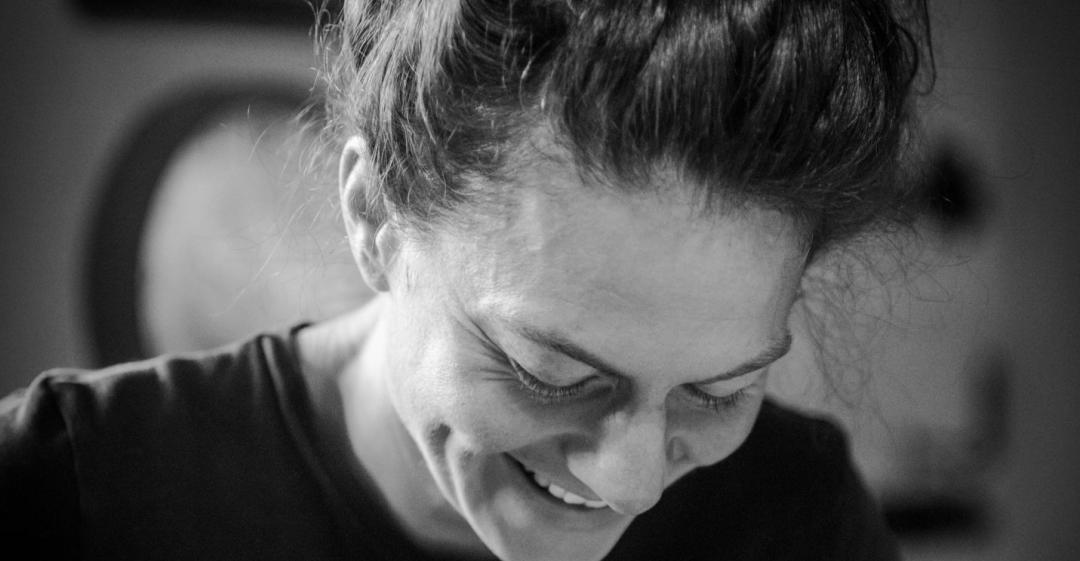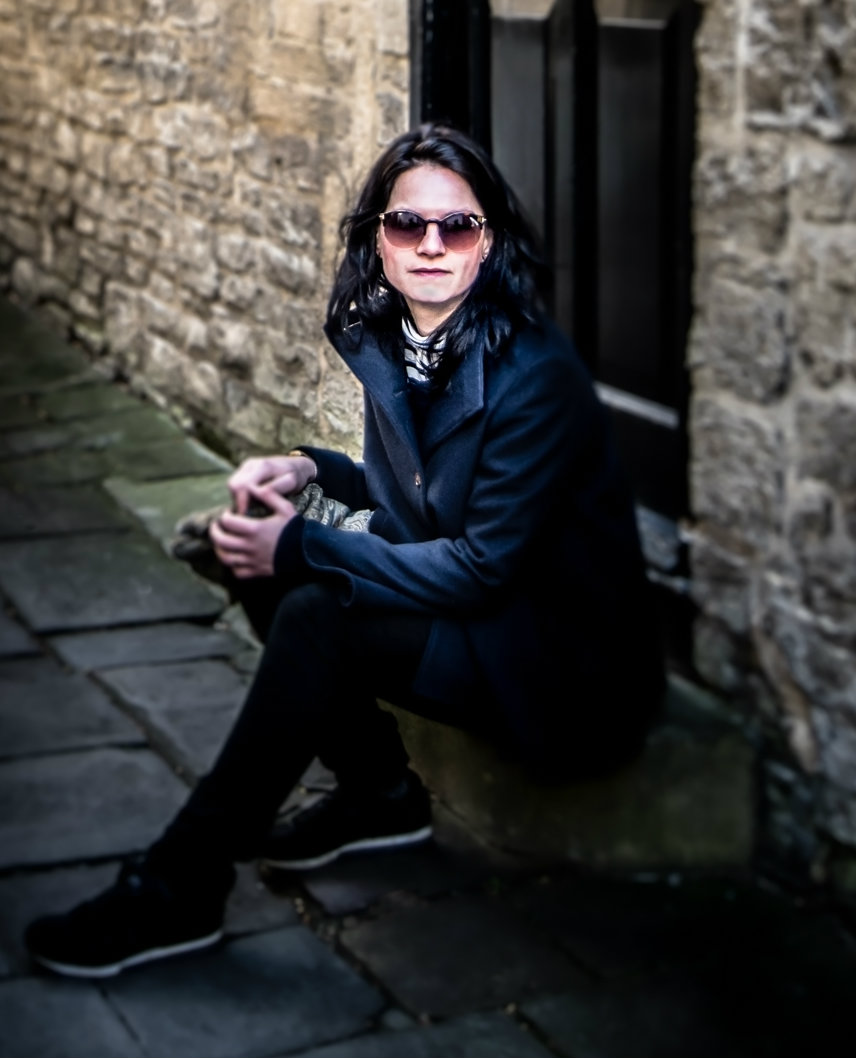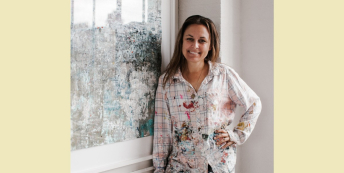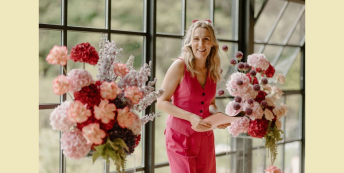“I began to feel so anxious about going into work that I started to feel ill.”

What work were you doing previously?
I was working as a primary school teacher.
What are you doing now?
Now, I'm working as a full-time ceramicist.
I'm predominantly making tableware, but looking forward to other projects coming up in the future, including a couple of installations and some bespoke collections for private individuals. I'm also planning to develop some ceramic lighting.
How did you feel in your work before you decided to make the change?
I knew that the profession I was in wasn't really for me.
Teaching has to be a real vocation.
I began to feel so anxious about going into work that I started to feel ill, and it was having a really detrimental effect on our family life. I was always tired and irritable, because I was always thinking about the things I ought to be preparing for school. I knew that I wasn't really focusing on our home-life because I perpetually felt that there was more school work I could be doing.
And I didn't feel I had the energy or inclination to help my own small children with their homework or reading, because I had been doing it all day with other people's children!
I also started to resent having to miss important events in my children's lives because of work commitments. Sports days, school plays and enrichment afternoons are important, especially when you're little, and I wanted to be able to be there for my children.
Why did you change?
I realised that if I didn't take the plunge, then I probably never would.
I had become so unhappy in my job that for my own well-being, and that of my long-suffering husband, I knew I had to make a change.
In a sense, I was lucky, because as a recently qualified teacher, I was earning an entry-level salary.
To put this into context, when I was at at art college twelve years ago, I worked as an usher in a theatre. I earned more as an usher back then than I was earning as a full-time teacher today.
It's difficult entering any profession at a slightly later stage in life, because usually one's financial commitments are greater, and obviously your earnings don't always correspond! But it did also mean that I didn't have the anxiety of taking a massive pay cut - it seemed an achievable goal to replace my teaching salary.
I had also been studying for a PhD at Glasgow School of Art. Spending time in an art-school environment reminded me how important the process of designing and making is to me; it is an integral part of who I am, and that realisation led me to reconnect with my practice.
When was the moment you decided to make the change?
I happened to be working with a particularly unsupportive colleague, who was doing her best to make my job more difficult that it needed to be.
Teaching is tough enough, without having the additional effort of negotiating work politics.
And then I went to collect my daughter from a friend's house. She had a banner strung up in her kitchen which said, "Do what you love!"
The decision was made.
How did you choose your new career?
It wasn't so much a question of choosing, more a realisation that I needed to get back to what I loved doing.
After graduating from Central Saint Martins when I was younger I worked as a ceramic designer, supplying a number of outlets in London, so in the back of my mind, I always knew that it was possible to make a living from my work.
Then, more recently, I made some bone-china bowls for a friend's birthday. She was absolutely thrilled with them, and suggested that I should pursue my ceramics full time: an idea that subconsciously I had been trying to suppress for a long time, because I suppose I felt it was more financially responsible to try and pursue a conventional career path.
I realise in retrospect how wrong I was!
Are you happy with the change?
It's a privilege to be able to do what you love, and I'm very conscious of how lucky I am.
Whilst I have absolutely no regrets about my decision to pursue ceramics full time, I'm still terrified of the financial responsibility I have. I have three small children who are entirely reliant upon me making this work, so I have to be utterly disciplined and focused.
But I also feel that a huge weight has been lifted, and that I'm on the right path. I'm being true to myself, and that is a good place to start.
What do you miss and what don't you miss?
There is very little I miss about teaching...
The friendships and the shared experiences, yes; but the feeling of being under constant scrutiny, no.
I felt like a fraud when I was teaching, and that any moment, someone would blow my cover. Now, I feel utterly confident in my work, which is a revelation!
I get to make decisions and trust my instincts, which I never felt able to do in my previous profession. I love the autonomy.
How did you go about making the shift?
With spontaneity, impulse and not allowing myself to be swamped with anxiety about the myriad of ways in which it could fail.
I had to take a huge leap of faith and trust that I would find ways of overcoming the inevitable hurdles.
What didn't go well? What wrong turns did you take?
Ask me in a few months time.
At the moment, I'm still trying to turn around all the initial blips into positive outcomes, so I'm not admitting to any mishaps just yet...!
How did you handle your finances to make your shift possible?
I'm very conscious that 'pursuing your dream' isn't always financially possible; I still don't know how I am going to make it work, but I know that I have to give it my very best shot.
I had of course given our finances a lot of consideration before taking the plunge, but if you don't have a lot of money to start with, there isn't much that you can do in order to ease that transition.
What was the most difficult thing about changing?
Without doubt, it's been the anxiety about how we'll meet our financial commitments each month.
That, and actually selling the work! Of course, the two go hand-in-hand. Lots of people are really complimentary about my work, but I have a lot to learn about translating appreciation of the work into sales.
(Actually, that's not quite true. I know exactly what I need to do, but unfortunately, it involves phoning people up and talking to them... probably one of my biggest fears!)
I'm not a salesperson, but the moment I have a financial breakthrough, I will be appointing one!
What help did you get? 
So far, I've not had any professional support to launch my business, but the encouragement of supportive friends counts for a lot.
And my very supportive husband (who is a photographer) built my website and takes the most wonderful photos of my work. Sometimes, I worry the photos are too good...
What resources would you recommend to others?
I love Instagram (although it's still pretty new to me) for the spontaneous interaction and networking potential. It's an amazing global platform for promoting your work. And great product shots... we live in a visual culture, and if you don't invest in great photography, you are putting yourself at a huge disadvantage.
What have you learnt in the process?
- Run as often as you can.
- There is nothing as restorative as a good night's sleep.
Honestly, I don't love running, but the effects of it are incredible; they totally outweigh the slight discomfort of running up a hill into the prevailing wind.
Do it. It will change your world, and make everything seem achievable. It gives you a sense of mental clarity that is exhilarating.
What would you advise others to do in the same situation?
You have to do what you love, and hope (very hard!) that enough opportunities will present themselves along your journey to allow you to feed your family, pay the rent and keep doing what you love.
I certainly don't feel I have all the answers, and there will always be moments of doubt. But you have to have faith in yourself, and the support of those who love you.
A lot of well-meaning people will try to encourage you to do the sensible thing, and pursue financial stability. But if you are honest with yourself and really seek out the path that's right for you, then you have to follow that path and hope that enough financial reward will follow.
Be brave!
To find out more about Becky's work, visit www.beckymackenzie.com.
What lessons could you take from Becky's story to use in your own career change? Let us know in the comments below.



